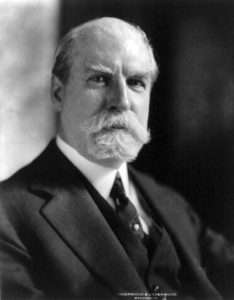The Volokh Conspiracy
Mostly law professors | Sometimes contrarian | Often libertarian | Always independent
Today in Supreme Court History: April 11, 1862
4/11/1862: Chief Justice Charles Evans Hughes's birthday.

Editor's Note: We invite comments and request that they be civil and on-topic. We do not moderate or assume any responsibility for comments, which are owned by the readers who post them. Comments do not represent the views of Reason.com or Reason Foundation. We reserve the right to delete any comment for any reason at any time. Comments may only be edited within 5 minutes of posting. Report abuses.
Please to post comments


Winner of the Charles Evans Hughes lookalike contest!
Pierson v. Ray, 386 U.S. 547 (decided April 11, 1967): state judges are immune from §1983 liability for judicial acts (here, an allegedly racist sentencing decision against plaintiffs who were trying to integrate a whites-only bus station) (this case established the doctrine of “qualified immunity” -- arresting police officers had defense of “good faith and probable cause” under statute later declared unconstitutional)
New York Indians v. United States, 170 U.S. 1 (decided April 11, 1898): need another treaty (or Congressional authorization) to throw Indian lands open to settlement after tribe did not move onto land within time required by treaty
Specht v. Patterson, 386 U.S. 605 (decided April 11, 1967): can’t sentence someone for something he wasn’t convicted for even though related to offense for which he was convicted (convicted for “indecent liberties” carrying maximum 10 year sentence but sentenced for indeterminate term under state Sex Offenders Act)
Granville-Smith v. Granville-Smith, 349 U.S. 1 (decided April 11, 1955): striking down Virgin Islands statute requiring six weeks residency before filing for divorce because V.I. could only legislate on local matters and statute was designed to apply to those outside
The Linseed King, 285 U.S. 502 (decided April 11, 1932): admiralty law applied to suit arising from ferry sinking after hitting ice in lower Hudson River (between Edgewater, N.J. and 96th Street, Manhattan)
United States v. Lefkowitz, 285 U.S. 452 (decided April 11, 1932): need warrant for “general exploratory search” of residence incident to arrest for violation of liquor laws (more or less overruled, see discussion in Arizona v. Gant, 2009)
The Northern Belle, 154 U.S. 571 (decided April 11, 1870): affirming damages arising from breaking apart of barge on sand bar; barge had rotten timbers and though wind was violent, if properly repaired would not have foundered
Joseph Schlitz Brewing Co. v. United States, 181 U.S. 584 (decided April 11, 1901): bottles and corks are not “ingredients” of beer and therefore brewer not entitled to refund of tariffs on “imports” such as the hops and barley; brewer had argued that bottled beer is in the nature of an ingredient because the beer has to be in the bottle for heating to prevent second fermentation (I think I’ll order just from the tap from now on)
Hale v. Kentucky, 303 U.S. 613 (decided April 11, 1938): conviction of black man vacated upon showing that blacks had been excluded from grand jury
Smiley v. Holm, 285 U.S. 355 (decided April 11, 1932): where state (Minnesota) must be redistricted, but proposed redistricting was vetoed by governor, there are no districts and Representatives have to be elected at large
Pierson v. Ray, 386 U.S. 547 (decided April 11, 1967): state judges are immune from §1983 liability for judicial acts (here, an allegedly racist sentencing decision against plaintiffs who were trying to integrate a whites-only bus station) (this case established the doctrine of “qualified immunity” -- arresting police officers had defense of “good faith and probable cause” under statute later declared unconstitutional)
If QI was simply this, it wouldn't be a big deal. In this case, the police were fooled by a State statute they relied on in good faith. It's basically a mistake of law defense. Unfortunately, QI grew into the monstrosity we know today.
Which decision expanded QI? Was that Harlow?
Yes, Harlow v. Fitzgerald, 457 U.S. 800 (1982).
He had an awesome beard and stache. Such a bro!
https://media.gettyimages.com/id/515301862/photo/3-4-length-portrait-of-justice-charles-evans-hughes-in-his-robes-he-served-on-the-supreme.jpg?s=612x612&w=gi&k=20&c=dPVNmdDekBhaX0JxSdcnH8AWxweelo8Ppd86g7b5wag=
Happy Birthday to You!
Happy Birthday to You!
Happy Birthday to Charlie!
Happy Birthday to You!
Public Offices Election Act Case (Second Petty Bench, decided April 11, 1969): Not a POEA violation to send New Year's greeting cards to voters if it does not mention the election (POEA subsequently amended to prohibit candidates from sending all greeting cards except hand-written replies - which sucks if you're one of the three members of House of Councillors who are quadriplegic!)
Bribery Case (Third Petty Bench, decided April 11, 1988): Giving bribes to a member of Diet is illegal, even if the recipient is not a member of the committee that had jurisdiction over the bill the defendant sought to defeat through bribery
Kilby Patent Case (Third Petty Bench, decided April 11, 2000): You cannot enforce an invalid patent. Yes, you heard it right; before this decision courts have long held that invalidity of patent was not an affirmative defense in patent infringement dispute. (2004 amendment explicitly made it an affirmative defense)
Copyright Infringement Injunction Case (Second Petty Bench, decided April 11, 2003): Work-for-hire analysis is independent from whether the author was authorized to work under immigration law or was an employee under labor law
Tachikawa Anti-War Flyer Distribution Case (Second Petty Bench, decided April 11, 2008): Affirmed trespass conviction for inserting flyers into the mailbox at servicemembers' residence; freedom of speech does not apply because the owner of the residence (the Government) prohibited unauthorized entry